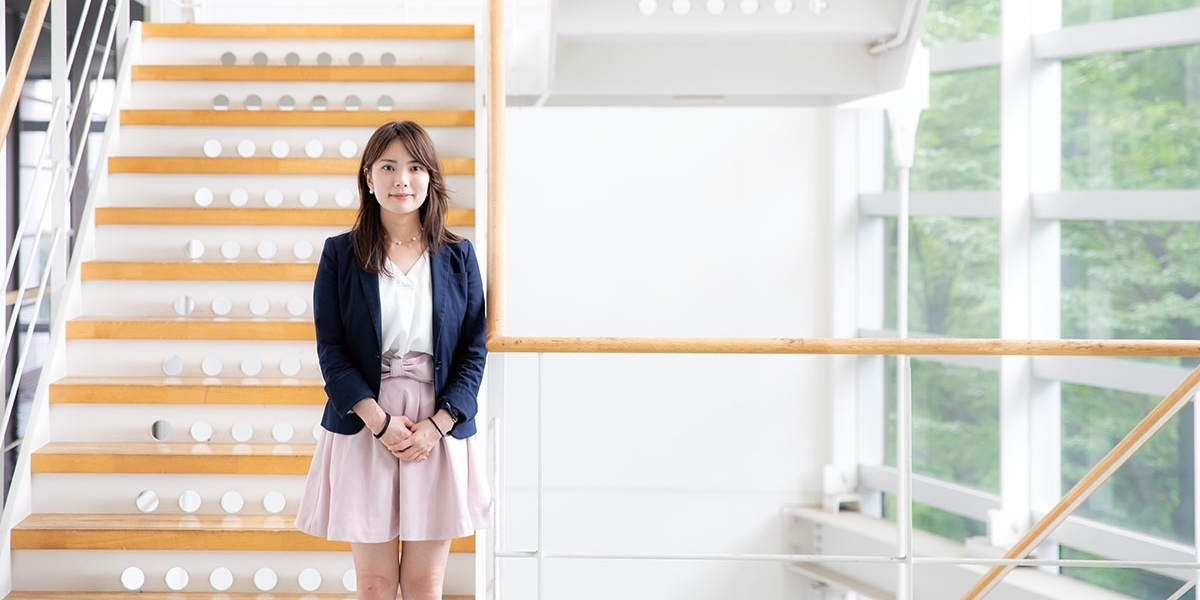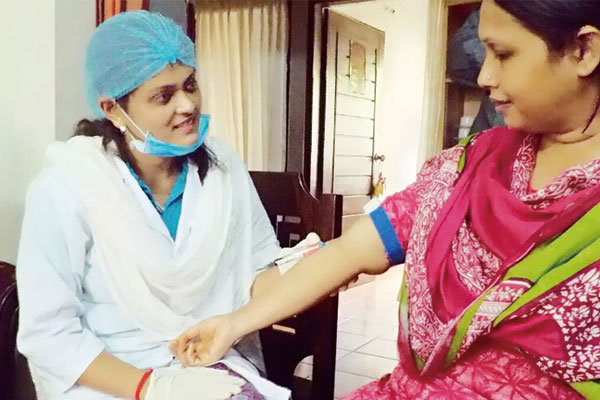Bringing medical care to every corner of the developing world Through technology and community-based activities

UTokyo 30s
Up-and-coming young entrepreneurs
Of the more than 350 University of Tokyo spin-off ventures, we have chosen to feature those by seven energetic young entrepreneurs in their 30s. Four of these companies are located in the venture support facilities on the Hongo Campus, one in the support facilities on the Kashiwa Campus, and one each in the Tokyo neighborhoods of Otemachi and Gotanda. How do these young people go about their daily work, and what kind of people are they? A few glimpses are presented here.
| Diagnostic and remote medical care services venture |
Bringing medical care to every corner of the developing world
Through technology and community-based activities
 Mari Sakoh
Mari Sakoh
CEO, miup Inc.


Led by CEO Mari Sakoh, the company miup Inc. is making use of IT to provide medical care services in the South Asian country of Bangladesh, whose flag resembles that of Japan. The name “miup” was coined by combining and shortening the phrase “mix up.” In Bangladesh, the company offers two kinds of services, as it seeks to fulfill its mission of bringing medical care to all corners of the world.
One of the services is a B2C (business-to-consumer) health screening service for upper-income urbanites. Qualified staff visit their homes, take blood and urine samples, which along with other data are analyzed in a lab for diagnosis and, depending on the results, introduce doctors or deliver appropriate medicine.
“What I found out after starting this service is that many people prefer to visit a clinic first. I understand that there is naturally resistance to having people you’ve never met come to your house and start examining your body. So it was only after we opened a clinic that the service became a success. Patients became amenable to home visits after first establishing a relationship with staff by visiting the clinic. Currently we are building a second clinic.”
The second is a B2B (business-to-business) service, operating a clinical testing center. Along with providing testing commissioned by local medical facilities that have learned of the reputation of miup’s lab performing data analysis, miup also provides a management system for companies when they establish medical facilities. Despite the country’s rapid economic growth, there are few medical facilities in Bangladesh, and foreign-affiliated corporations are actively entering the market.
“I feel that the trust and experience we have patiently built up in the region are paying off. I did not expect that an IT company would end up working so closely with the local community.”
In fact, at the time the company was founded in 2015, the original plan was to commercialize a smartphone application that uses artificial intelligence (AI) to analyze information entered on the phone to diagnose illnesses. But despite their strong intention to deliver medical care to remote regions, mobile payment was not commonly used at the time and data verification was also inadequate, so that business never got off the ground.
“The situation has changed since then. Mobile payment is now in wide use, and the verification trial we’ve been carrying out with the Japan International Cooperation Agency (JICA) is nearly completed. There is large demand, as the people suffering from diabetes and other lifestyle-related diseases are as numerous as in Japan. We intend to develop this into the third pillar of our business.”
Sakoh, born into the family of the owner of a large hospital group based in her home prefecture of Ibaraki, had an unusually strict upbringing. Rebelling against her parents and the stress of a predetermined future as a successor to the family business, she left home at age 13. Sakoh spent a quarter of her life restless, traveling around Tokyo, the UK and New Zealand.
But that experience is “mixed up” with what led her to engage in supporting developing nations at the Department of Global Agricultural Sciences at UTokyo’s Graduate School of Agricultural and Life Sciences, and later to launch miup together with her colleague Takanori Hasegawa (currently a research associate in the Institute of Medical Science) who, at the time, was studying medical care and informatics.
“While my rebellion was very real, the contributions of my parents’ hospitals to the local community had also left a favorable impression in my heart as a child.”
Despite the differences in their approach – one is focusing on the local community while the other is looking at the world – the strong desire to help people through medical care has clearly been passed on from parent to child.
| Q & A | |
|---|---|
| What entrepreneur do you admire? Have you read any good books lately? | 「“MOTHERHOUSE Co. Vice President Daisuke Yamazaki.” “Jared Diamond’s Upheaval.” |
| What was your most painful exam experience in elementary school? | “Having to get down on my hands and knees to beg forgiveness from my ancestors for scoring 98 out of 100.” |
| What did you like in elementary school? | “Reading history books about various places in the world, and letting my imagination run freely before falling asleep. No doubt that was in reaction to having my future set in stone.” |
| How do you feel now that you are in your thirties? | “It’s an age when it becomes necessary to help those in their teens and twenties to make their talents blossom.” |

* This article was originally printed in Tansei 39 (Japanese language only). All information in this article is as of September 2019.






